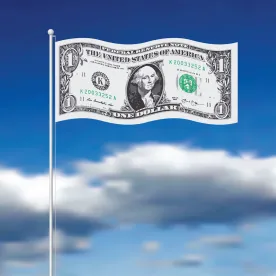Price gouging enforcement and litigation is front and center for company counsel and business managers nationwide. Our weekly round up highlights some of the most relevant news and information to our clients and friends.
Defense Production Act Price Gouging Enforcement
Federal prosecutors announced on August 6, 2020 that a Georgia businessman has been charged with hoarding and price gouging in violation of the Defense Production Act of 1950 (DPA). The businessman “allegedly saw the unprecedented COVID-19 global pandemic as an opportunity to make a profit,” said U.S. Attorney Byung J. Pak. “Desperate to find personal protective equipment during the pandemic, thousands of customers unfortunately paid his inflated prices.” According to Chris Hacker, Special Agent in Charge of FBI Atlanta, "Using the resources of all of our federal partners, we are making every effort to pursue anyone who tries to take advantage of citizens during this global pandemic.” From March 2020 to May 2020, the businessman allegedly engaged in price gouging and hoarding more than 200,000 face masks in violation of the DPA. This case is being investigated by the Federal Bureau of Investigation, U.S. Immigration and Customs Enforcement’s Homeland Security Investigations, Internal Revenue Service Criminal Investigation, and the U.S. Postal Inspection Service. For more information on the Defense Production Act, read our blog post: Price Controls under the Defense Production Act.
Senator Maria Cantwell Advocates for Federal Price Gouging Legislation at FTC Oversight Hearing
On August 5, 2020, U.S. Senator Maria Cantwell (D-WA) announced plans to introduce federal legislation targeted at price gouging. Senator Cantwell, who is the Ranking Member of the U.S. Senate Committee on Commerce, Science, & Transportation, stated, “I plan to introduce, in the coming days, federal legislation to do two things: to move both on a price gouging definition to make sure the law is clear that consumers can be protected in this area, and to enforce civil penalties for deceptive COVID scams.” FTC Chairman Joseph Simons agreed, saying, “Senator, we agree that price gouging is a very serious problem, especially for PPE and the like. We would vigorously support and enforce legislation if Congress passed a law on price gouging.” FTC Commissioner Rebecca Slaughter also agreed, saying, “We would really benefit from clear [price gouging] legislation from Congress, but very much share your view that this is a high priority and something that we can see the real life effects of for American people every day.” According to the Commerce Committee press release, “[t]he fact that all 50 states have price gouging hotlines and ready-made report forms shows how prevalent this issue is across the nation.”
California Winery Sues Storage Facility for Price Gouging
A California winery has accused the company managing its storage facility of raising prices by more than 1,000%, violating California’s price gouging laws. After informing the storage facility of its intention to move its wine, the storage facility allegedly gave the winery 72-hour notice to either remove its wine, or pay $.50 per gallon, a 625% increase from its current storage fee. According to the complaint, the storage facility agreed to no longer increase the storage fee and would allow time for the winery to remove its wine. The lawsuit further alleges that the storage facility subsequently sent the winery an invoice with a store fee that represented a 1,250% increase. California’s price gouging law, which prohibits raising the price of covered goods and services by more than 10% during a declared state of emergency, includes storage services. In addition to price gouging violations, the lawsuit alleges causes of action for racketeering, fraud and deceit, unfair competition under California Bus. & Prof. Code § 17200, unjust enrichment, conversion. The winery seeks injunctive relief and damages, including general and special, as well as exemplary and punitive damages.
California Convenience Store Defends Against Price Gouging Allegations
A California convenience store was recently accused of price gouging Lysol, charging consumers $22 for a 19 ounce can. In response to the allegations, the store owner says that Lysol tripled in price, claiming that “sometimes [he] has to cross the border into Mexico to get the product.” According to Monterey County Deputy District Attorney Emily Hickok, their office has looked into 75 complaints related to pandemic price gouging. Hickok stated that “[f]or the majority of complaints, we found that there was not price gouging, but that sellers had obtained different products due to shortages. Hickok further commented that “[i]f it's a product you did not sell prior then you are allowed to sell up to 50% of what it cost you acquire that product. If a seller is not increasing their prices but just obtaining a new product that they didn't sell previously and they're obtaining that product for a high price and turning and selling it for a reasonable profit that's not necessarily price gouging." California’s price gouging law is currently in effect through September 4, 2020. For more information, read our blog post: California’s Crackdown on the Price Gouging Gold Rush.
Utah Businesses Fined for Price Gouging
A Utah business was recently fined for allegations of price gouging. The company, a Pleasant Grove-based catering company, was ordered to return gains from selling bags of flour at unlawful prices. Utah’s Price Controls During Emergencies Act states that “a person may not charge a consumer an excessive price for goods or services sold at retail…[unless] the price charged for the good or service does not exceed the sum or: (i) 10% above the total cost to that person of obtaining the good or providing the service; and (ii) the person’s customary markup.” Utah Code Ann. § 13-41-201. However, if the good or service was not sold by the person during the thirty day period preceding the state of emergency, “a price is not excessive if it does not exceed 30% above the person’s total cost of obtaining the good or providing the service.” Increases in flour prices is part of a broader pandemic related flour shortage. Retail flour sales were up over 154% for the week ending March 28, 2020, compared to the same week in 2019. U.S. in-store flour sales for the four week period ending on April 11, 2020, were $143.9 million, compared to $55 million during the same period in 2019. King Arthyr Baking Company, one of the country’s largest flour companies, saw retail flour sales almost triple in the month of March.







 />i
/>i

